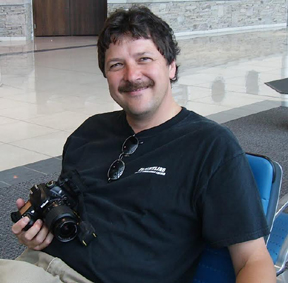Douglas Shearer’s story “Treatment” appeared in the Winter 2015 CAREGIVERS issue of r.kv.r.y.. Songwriter Adam Haggarty called the story haunting and said he loved the dark. direct style. He interviewed the author at his recording studio near Toronto, Canada.
Adam Haggarty: Your story, “Treatment,” is fictional, but does this story draw from real life or family experiences?
Douglas Shearer: Like the narrator, my father died from cancer when I was 15 and some of the narrator’s teenage memories mirror my own. My dad had a dry sense of humor, could not sing, and he liked to gamble. I’d never heard of cancer until my father got it, but it seems these days I always know someone who is fighting it. When my father-in-law got cancer, I thought I knew what to expect. I was wrong. I felt helpless and angry. This story grew from those feelings. My narrator took on a life of his own and explored topics I hadn’t originally thought of.
I wrote this piece in first person because I needed to climb inside my character, if that makes sense. But for me, I think my best writing comes when the character becomes so developed that he/she can push me aside (so to speak) and write for themselves. The narrator eventually re-wrote the ending. This story went through several revisions before I was happy with it, and I think the first person writing gives it a certain intimacy. The result was that some of my first workshop reviewers said they would pray for me. Others said I shouldn’t be posting non-fiction in the fiction section. I had to assure them that this piece is fiction, and without giving away the story for someone who may not have read it yet, I was a little worried that I’d end up with the police at my door.
AH: This story is quite dark, which I like. It’s very haunting. Does this represent your style?
DS: I started writing for young children, then I wrote my first novel-length manuscript for young adults. It’s a mystery/thriller called Chasing the Dragon Snake. It deals with some dark subject matter. I’m looking for a home for it, but there are no werewolves, vampires, or witches in it, and it’s not dystopian so I may have a tough time placing it. Most of what I write now is for adults. I recently fulfilled a New Year’s Resolution of submitting twelve new short stories in twelve months. Treatment was one of those stories and after looking back at the others, I’d have to say that yes, there is a little darkness to all my stories, some more so than others. I did write a humorous story, but it was about Satan and the Grim Reaper, so a little darkness there too.
AH: Who would you say was your greatest influence on the way you write?
DS: It’s funny, but until recently, I couldn’t have answered that question. When I was workshopping one of my stories, a fellow writer commented that my style felt oddly remote and referred to Edgar Allan Poe’s writing saying that he somehow managed to engage our emotions with unhinged narrators but didn’t know how he did that. I got two more reviews that mentioned Poe and as luck would have it, I found an Anthology that was looking for original Poe-like story ideas. That story, “Intimate Enemy,” has survived the first round of cuts for the anthology. I will often read Poe, and sometimes even his word choice can give me an idea.
In an introduction to a collection of short stories, Ben Bova wrote about “The Art of Plain Speech.” Bova wanted the writer to be invisible to the reader. Isaac Asimov was quoted as saying he wanted his writing to be clear. Some of his critics called his writing simplistic, yet he won all sorts of awards. I’ve read a lot from both these authors and without knowing it, they’ve influenced my style. Like you said, dark and direct. Dark like Poe, and direct like Asimov and Bova. I know that not everyone will like my style and I’m okay with that.
AH: What is your approach to writing? Do you have scheduled writing sessions or do you jump onto the computer when you’ve got an idea running around in your head?
DS: I schedule myself to write every Saturday and Sunday morning until at least noon. On a good day, I get four hours in. If I go any longer, I’m exhausted. Sometimes I do put in more, but I know I’m going to pay for it. If I have an idea that pops into my head, I have to write it down. Whatever I’m doing, I excuse myself and go write the idea down. I have a pen and paper beside the bed for those moments when a dream inspires a story. The only problem is that sometimes when I read my notes later, they don’t make any sense to me. I have a note in my writing room (I refuse to call it an office because that sounds too much like work) that says, “Story about a homeless person living in the woods.” Unfortunately, I can’t remember what specifically I was thinking about when I wrote the note.
Normally I write at the computer, but one day this summer, I got up before anyone else, made a pot of coffee and decided to write in the back yard with pen and paper. I wrote a complete short story and entered the mess of scribbles into the computer the next day. It was a story that required very little editing and was ranked the best story for the month on the workshop I use. So maybe slowing down my mind to the speed of my pen produces good results. That story, “Hung Out to Dry,” has an ever-present ambiguity that requires the reader to make certain assumptions, which prove to be wrong, unless you read too quickly, then you will miss the whole point.
AH: R.kv.r.y. quarterly explores recovery: What does recovery mean to you?
DS: Recovery is the process of getting something back that you once had. It could be a lost wallet or pet, or it could mean getting back your health either physically or mentally. There is also recovery on an emotional level—getting back to a sense of calm after a loss, which can be one of the hardest things to recover from. Writing this story helped me with the recovery from loss.
Sometimes though, there are things that you simply can’t recover from, and perhaps realization and acceptance of that can be a form of recovery as well.
Adam Haggarty is singer/songwriter/guitarist and frontman for the band Before the Curtain. He is currently writing/producing rock and pop acts in Los Angeles.



Pingback: Treatment | Rkvry Quarterly Literary Journal